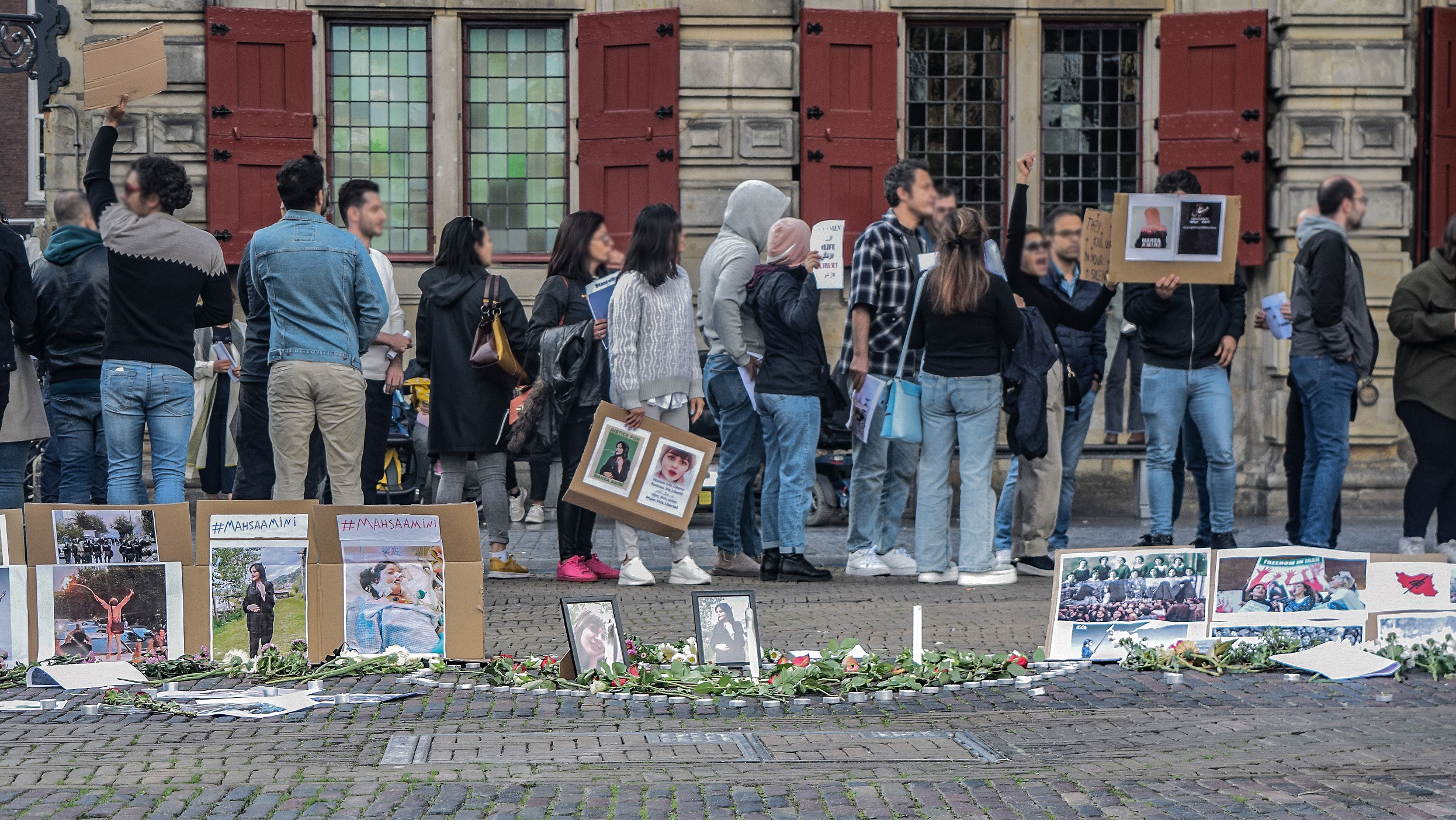Dewis, the Delft network of women scientists, condemns the violence in Iran and supports Iranians at TU. Meanwhile, protests in Iran continue.
Memorial for Mahsa Amini on the Markt in Delft on 25 September 2022. (Photo: Organisation Commemoration Mahsa Amini)
Delft Women in Science (Dewis) condemns ‘the violent attacks on civilians and students during the protests that followed the in-custody death of Mahsa Amini’ and stands in solidarity ‘with all women’s rights and freedom of expression’. This is written in a Dewis solidarity statement with women ‘and their allies’ in Iran. To be clear, the statement does not come from TU Delft’s Executive Board, which did receive several calls to publicly issue do this.
Dewis writes that Iranians at TU Delft find it impossible to focus and function because they are going through ‘a very distressing time’ ‘with deep concerns’ about family and friends in Iran, who are additionally very difficult to reach. People who need help can contact their managers, confidential advisors or university social workers (intranet), according to Dewis. For students, there are also various forms of support, for which Dewis refers to TU Delft’s welfare and studies website.
- On 9 November between 12:30 PM and 1:30 PM, Dewis is organising a ‘Virtual Coffee’ Zoom meeting for anyone who wants to ‘voice their concerns’ or express an opinion or view on the situation in Iran in general and the situation of women in particular.
The large-scale protests in Iran started after Mahsa Amini was arrested by the Iranian ‘morality police’ for supposedly breaching Islamic dress codes and died later from policy brutality.
Protests broke out in 15 Iranian cities with hundreds of women casting off their headscarves and cutting their hair. Many students from various universities took part, independent Iranian media reported. On 6 October, 116 students were reportedly detained. Last week, Iranian students boycotted lectures and demanded the release of their fellow students.
Campus protests
Iranian President Ebrahim Raisi had thrown oil on the fire a week earlier during a speech at Alzahra University in capital Tehran. He warned of the influence of foreign powers that would use universities for their ‘evil purposes’. Many female students shouted at him to ‘fuck off’ and that the oppressors could ‘drop dead’.
To calm things down, the government came up with a plan for special zones on campuses where teachers and students could discuss freely. Students huffed it away: they see it mostly as a sop. Despite the fierce repression, there are still large demonstrations. Twenty thousand protesters have now been arrested and four hundred have died.
Expressions of support
Globally, the protesters can count on a lot of sympathy. On Sunday, at least one thousand people came to a large support rally (in Dutch) on Dam Square in Amsterdam. In recent weeks, there were also rallies in The Hague and Eindhoven, and Iranian students commemorated Mahsa Amini at TU Delft and the Free University (Vrije Universiteit).
Erasmus University and the University of Groningen declared solidarity with the protesters in Iran, as did the Dutch scientific society KNAW (in Dutch). The Dutch government has previously condemned the violence, according to answers (in Dutch) by Minister of Foreign Affairs Wopke Hoeksta to GroenLinks parliamentary questions. He wants the EU to impose human rights sanctions on Iran.
Delta, Saskia Bonger / HOP, Peer van Tetterode
- Also read these letters: TU Delft, show your support to Iran and Iranians in Delft en Diversity and inclusion in traumatic times.
Do you have a question or comment about this article?
s.m.bonger@tudelft.nl


Comments are closed.